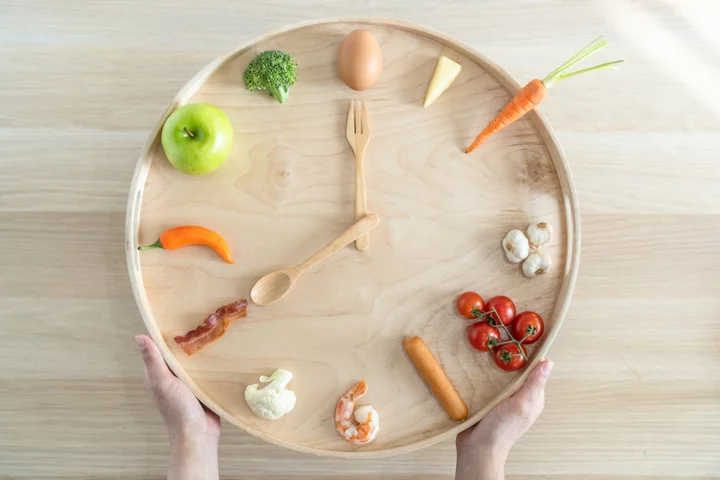
Climbing more than five flights of stairs a day can decrease the chances of heart disease, study suggests
Cardio isn’t so bad if you take it in small steps. Climbing at least 50 stairs each day could significantly slash your risk of heart disease, according to a new study. The research, published in the journal Atherosclerosis, found that ascending more than five flights of stairs daily could reduce the risk of cardiovascular ailments by about 20 per cent. Cardiovascular diseases such as Atherosclerotic cardiovascular disease (ASCVD) along with coronary artery disease and strokes are the leading causes of morbidity and mortality worldwide. “Short bursts of high-intensity stair climbing are a time-efficient way to improve cardiorespiratory fitness and lipid profile, especially among those unable to achieve the current physical activity recommendations,” said co-author Dr Lu Qi, HCA Regents Chair and professor at Tulane University’s School of Public Health and Tropical Medicine in New Orleans. “These findings highlight the potential advantages of stair climbing as a primary preventive measure for ASCVD in the general population.” For the study, researchers used data from a UK Biobank of 450,000 adults and participants were analysed based on their family history of cardiovascular disease as well as their genetic risk factors and established risk factors. Participants were also asked about their lifestyle habits and their frequency of climbing stairs, with the median follow-up time being 12.5 years. The results revealed that climbing more stairs daily reduced the risk of cardiovascular disease in those who were less susceptible, with Dr Qi saying the increased risk of heart disease in more susceptible people could be “effectively offset”. “This study provides novel evidence for the protective effects of stair climbing on the risk of ASCVD, particularly for individuals with multiple ASCVD risk factors,” Dr Qi added. ‘A significant training effect’ Dr Nicolas Berger, a senior lecturer in sport and exercise at England’s Teesside University, who was not a part of the study, says walking up staircases has more benefits than walking on a flat surface because it “requires the use of more muscles as well as some balance and gross motor skills.” He says even though these may be in “short bursts”, it still “requires a lot of activity from your cardiovascular system and that is why people often find themselves out of breath whilst climbing stairs. “These short, intermittent bursts of activity have large benefits in terms of reducing the risk of cardiovascular disease. They can significantly increase your heart rate and oxygen uptake and cause positive adaptations in the body,” Dr Berger adds. Although 50 steps a day might not seem like much “it can have a significant training effect.” This type of movement activates muscles such as the glutes, quads, hamstring and calves, as well as muscles in the core, Dr Berger says. If you are not much of a runner, Dr Berger suggests taking stairs may be a useful option. “It’s an attractive alternative to just walking or running for many, due to the easy access for most people in their houses or when out. “If there are no stairs available, walking up and down steep gradients also has similar benefits and demands. Getting up off the floor or low ground has benefits in terms of strength and balance, but not so much for the cardiovascular system. “Overall, incorporating this activity into daily habits for sedentary people, people at risk or anyone trying to stay healthy is a good suggestion,” he adds. Read More How many steps a day can cut risk of early death (and it’s not 10,000) Tread carefully: Do we really need to walk 10,000 steps a day? What I gained (and lost) by walking 10,000 steps each day for 5 months Is a four-day week a good idea? | You Ask The Questions 9 science-backed ways to lose weight without going on a diet A Japanese doctor who studied longevity — and lived to 105 — said if you must retire, do it well after 65
2023-09-30 00:23

Rhyming Is Encouraged in the New Dr. Seuss Edition of ’Scrabble’
You can play Dr. Seuss ‘Scrabble’ here or there—you can play it anywhere!
2023-09-29 23:22

Lainey Wilson and Jelly Roll among big winners at 2023 People’s Choice Country Awards
Lainey Wilson and Jelly Roll won big at the 2023 People’s Choice Country Awards, scooping the Female and Male Artist of 2023 gongs, as well as combining to land The Collaboration Song Of 2023 for tune 'Save Me'.
2023-09-29 19:25

Snow Patrol's former bassist Paul Wilson quit to start a metal-inspired project
Paul Wilson also touched on the "gossip" about alleged arguments among the rest of Snow Patrol.
2023-09-29 19:22

Take That reveal intense training in preparation for huge 2024 tour
Take That are embarking on a huge UK and Ireland tour next year.
2023-09-29 19:21

The exact time Brits find themselves ‘uncontrollably hungry’ revealed
One in four Brits find themselves uncontrollably hungry by 10:30 am, research has found. A study of 2,000 adults found they typically snack twice a day, with sausage rolls, crisps, biscuits and bananas the most popular choices. But 27 per cent get the munchies by mid-morning, and a third have even got out of bed for a midnight snack. Other popular treats include chocolate bars, nuts, cake and crackers. A spokesman from Wall’s, which commissioned the research as part of its ‘When hunger calls, grab a Wall’s’ campaign, said: “Sometimes a snack can be an absolute saviour to your day as the research has shown. “Uncontrollable hunger at times can absolutely take over and leave you unable to get on with your day until it’s been satisfied. “And there’s real enjoyment taken from ridding of this hunger whenever it strikes with a snack never being far away.” The study also found 23 per cent of adults don’t usually have breakfast, with 36 per cent of those claiming they are more prone to snacking as a result. When watching TV, over the weekend and in the workplace were the most common times and places to chomp on a treat. And more than £10 is spent on them in a typical week, according to the OnePoll data. More than seven in 10 (73 per cent) have snacks stocked up in their homes for when they need them, and 25 per cent have hidden them from loved ones. While 21 per cent have a dedicated drawer in their workplace for keeping them for when hunger calls. The importance of a snack cannot be underestimated though as 60 per cent believed a great treat can save a rubbish day. To avoid a bad day, 33 per cent will typically pack one for themselves when leaving the house. However, 20 per cent have been made to feel guilty about their snacking habits with others pointing out the frequency they so do. A spokesperson from Wall’s [https://www.instagram.com/wallspastry], added: “Hunger can be overpowering and there’s nothing worse than being caught short and having nothing to hand. “However, there’s no better feeling than finally chomping on something after having been hungry for a while and satisfying that desire. “Snacks such as sausage rolls are a great and versatile option for when hunger calls.” Top 20 most popular snacks, according to Brits: 1. Crisps 2. Biscuits 3. Chocolate bar 4. Banana 5. Nuts 6. Cookies 7. Cake 8. Toast 9. Apple 10. Grapes 11. Crackers 12. Cereal bar 13. Yoghurt 14. Sausage roll 15. Orange/satsuma 16. Cereal 17. Doughnut 18. Berries 19. Flapjack 20. Popcorn Read More Smoking during pregnancy doubles premature birth risk, study finds Four in ten Brits ignore potentially serious eye problems, study finds Study finds women only give themselves 30 minutes of self-care a week Children avoid sleepovers due to fears of wetting the bed Most unwanted gifts people have received The best napping method to help with pulling an all-nighter
2023-09-29 18:55

'We might as well talk about it': Martin Scorsese refused to ignore history in Killers of the Flower Moon
Martin Scorsese wanted to address violence towards Native Americans in his new movie 'Killers of the Flower Moon'.
2023-09-29 18:28

James Gunn confirms three stars who will return in all-new DC Universe
James Gunn has said that three stars will be continuing in their roles in the revamped DC Universe.
2023-09-29 18:18

ABBA's Agnetha Faltskog and Gary Barlow share new version of I Should’ve Followed You Home
Agnetha Faltskog and Gary Barlow first released the song a decade ago.
2023-09-29 17:22

Eli Lilly settles whistleblower lawsuit over manufacturing problems
By Dan Levine and Marisa Taylor Eli Lilly and Co and a former employee agreed to settle a
2023-09-29 17:18

Ed Sheeran releases Autumn Variations
Ed Sheran has released the first of his seasonal albums, 'Autumn Variations'.
2023-09-29 17:18

Daily activities could help lower heart attack risk, study suggests
Everyday activities like walking up the stairs or playing with children could help lower the risk of heart attack, stroke and even premature death, new research suggests. The experts found that although short bouts of incidental activity are good for you, the how long you do them for, and how vigorously makes a difference. The findings may make physical activity much more accessible to people who are unwilling or unable to take part in structured exercise, researchers say. They found that the longer the bouts of activity, the better, regardless of total activity levels. The large majority (97%) of this everyday physical activity, like walking to the bus stop or household chores, was made up in bouts lasting less than 10 minutes. In a group of people who said they did not take part in exercise or sport, short bouts of less than 10 minutes at a moderate to vigorous intensity were associated with a steep decrease in heart attack and stroke, and death by any cause. According to the findings, moving consistently for at least one to three minutes was linked to significantly more benefit (29% lower) than very short bouts of movement that lasted less than one minute. Senior author Professor Emmanuel Stamatakis from the University of Sydney’s Charles Perkins Centre, in Australia, said: “From walking up the stairs to speedily mopping the floors, in recent years we’ve come to understand that it is not just structured exercise that is good for our health, but we know very little about how these short bouts of incidental activity translate to health benefits.” He added: “The take-home message here is any type of activity is good for your health, but the more effort you put into those daily tasks and the longer you keep up that energy, the more benefits you are likely to reap. “If you are huffing and puffing and unable to hold a conversation for some of that time you have hit the sweet spot.” Lead author Dr Matthew Ahmadi said: “The idea of accruing short bouts of moderate to vigorous activity through daily living activities makes physical activity much more accessible to people who are unwilling or unable to take part in structured exercise. But as we see in this data, the length and the vigour people put into these incidental activities matters.” The risk of all-cause death and major cardiovascular events (heart attack or stroke) was 29-44% lower for activity periods of five minutes to less than 10 minutes, than bouts of less than one minute. The study, published in The Lancet Public Health, also found that the higher the amount of vigorous activity in each bout the better. People who huffed and puffed for at least 15% of the activity period (10 seconds per minute) saw the greatest benefit. Bouts of less than one minute were also associated with benefits if the above 15% vigorous activity rule was applied, researchers found. The researchers used data from wrist devices worn by 25,241 people aged 42 to 78, in the UK Biobank database, and artificial intelligence to analyse the seven-day physical activity patterns in people who said they did not exercise. The study linked these physical activity patterns with health records, following people for close to eight years to identify how length and intensity of physical activity bouts were linked to health status. Dr Ahmadi added: “This study suggests people could potentially reduce their risk of major cardiac events by engaging in daily living activities of at least moderate intensity where they are ideally moving continuously for at least one to three minutes at a time. “In fact, it appears that this can have comparable health benefits to longer bouts lasting five to 10 minutes.” Read More Charity boss speaks out over ‘traumatic’ encounter with royal aide Ukraine war’s heaviest fight rages in east - follow live From tiredness to sweating – subtle warning signs something could be wrong with your heart Breast Cancer Awareness Month: 9 brilliant beauty buys supporting good causes Smokers 2.6 times more likely to give birth prematurely
2023-09-29 16:48
